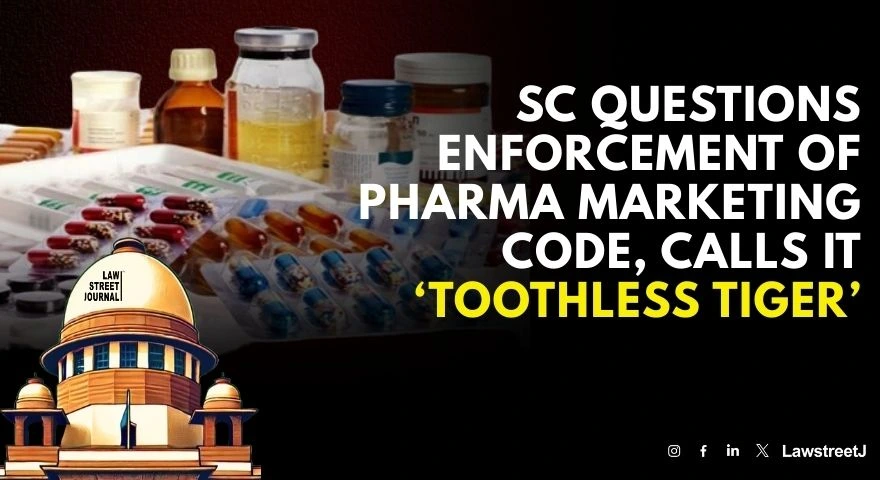NEW DELHI: The Supreme Court on Thursday asked the Centre if the Uniform Code for Pharmaceutical Marketing Practices (UCPMP) 2024, which came in force last year, was being implemented with force or it was just a toothless tiger.
A bench of Justices Vikram Nath and Sandeep Mehta pointed out the actual difficulty was in the implementation of the norms.
To a plea seeking an uniform code for marketing practices of pharmaceutical firms to curb any unethical ways to promote drugs, Solicitor General Tushar Mehta, appearing for the Centre, said the prayer made therein had become infructuous as a statutory regime was already in place.
"The difficulty is, regime is there in place, but whether that is actually implemented or not," the bench said.
Senior advocate Kapil Sibal, who also appeared in the matter, said a new regime was brought in last year.
"That is what the concern that if it is a toothless tiger, what is the purpose," the bench asked.
Mehta, however, responded, "It is a tiger with all power at its command".
The Uniform Code for Pharmaceutical Marketing Practices (UCPMP) 2024 came in force last year.
Mehta also contended the prayer has become infructuous.
"But to show that there is already a statutory regime in place, that would need some time," he said.
The bench then scheduled the matter for hearing on October 7.
On March 11, 2022, the court agreed to hear the plea and issued notice to the Centre seeking its response on the issue.
In a separate judgement on February 22, 2022, the Supreme Court had expressed its concern over pharmaceutical companies manipulating doctors prescription by gifts such as gold coins, fridges and LCD TVs to funding international trips for vacations or to attend medical conferences, in lieu of suggesting drugs manufactured by them.
In August, 2022, the court was told that the Central Board for Direct Taxes (CBDT) has accused makers of Dolo-650 tablet of distributing freebies around Rs 1,000 crore to doctors as consideration for prescribing the tablet.
The plea filed by 'Federation of Medical and Sales Representatives Association of India' sought a direction that till an effective law was enacted as prayed, the top court may lay down the guidelines to control and regulate unethical marketing practices by pharmaceutical companies or in the alternative, make the existing Code binding with proper and reasonable modifications/additions.
The plea said the Indian Medical Council (Professional Conduct, Etiquette and Ethics) Regulations of 2002 prescribed a code of conduct for doctors in their relationship with pharmaceutical and allied health sector industry, and prohibit acceptance of gifts and entertainment, travel facilities, hospitality or monetary grants from pharmaceutical companies.
"This code is enforceable against doctors, however, does not apply to drug companies, leading to anomalous situations where doctors' licenses are cancelled for misconduct which is actuated, encouraged, aided, and abetted by pharma companies. The pharma companies go scot-free," it claimed.
The plea alleged unethical marketing practices by pharmaceutical companies in their dealings with healthcare professionals. It made Department of Pharmaceuticals, Ministry of Law and Justice, and the Ministry of Health and Family Welfare as parties in the petition.
The plea contended that it is high time that the lacuna in ensuring the right to health is urgently filled up by an appropriate legislation.
It pointed out that there were abundant examples that showed how corruption in the pharmaceutical sector endangered positive health outcomes and put patients’ health at risk.
“As violations of this kind have become a recurring phenomenon and are progressively becoming more pervasive, the petitioners pray that a Statutory Code of ethical marketing for the pharmaceutical industry, with penal consequences, be established to curb such practices for the enforcement of the fundamental Right to Health of the people of India," the plea said.
The plea argued that due to the voluntary nature of the existing code, unethical practices continued to increase and have also surfaced during the COVID-19 times.
“By contrast, numerous countries across the world, including the United States, France, Germany, Hungary, Italy, UK, Venezuela, Argentine, Russia, China, Hong Kong, Singapore, Australia, South Korea, Philippines, Malaysia and Taiwan, have enacted stringent laws to curb corruption in the pharmaceutical sector,” it pointed out.
The plea claimed though termed as "sales promotion", in fact, direct or indirect advantages were offered to doctors (as gifts and entertainment, sponsored foreign trips, hospitality, and other benefits) in exchange for an increase in drug sales.
It said unethical drug promotion could adversely influence doctors' prescription attitudes and harm human health by over-use/over-prescription of drugs, prescription of higher doses of drugs than necessary and prescription of an irrational combination of drugs.
It claimed no enforceable law exists which regulates the promotion of drugs by pharmaceutical companies vis-a-vis healthcare professionals, and therefore, unethical practices continue unfettered.
Disclaimer: This content is produced and published by LawStreet Journal Media for informational purposes only and does not constitute legal advice. The views expressed are independent of any legal practice of the individuals involved.















